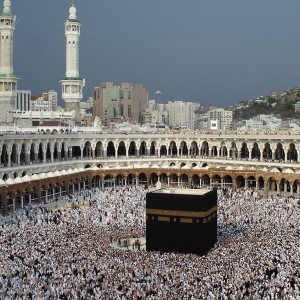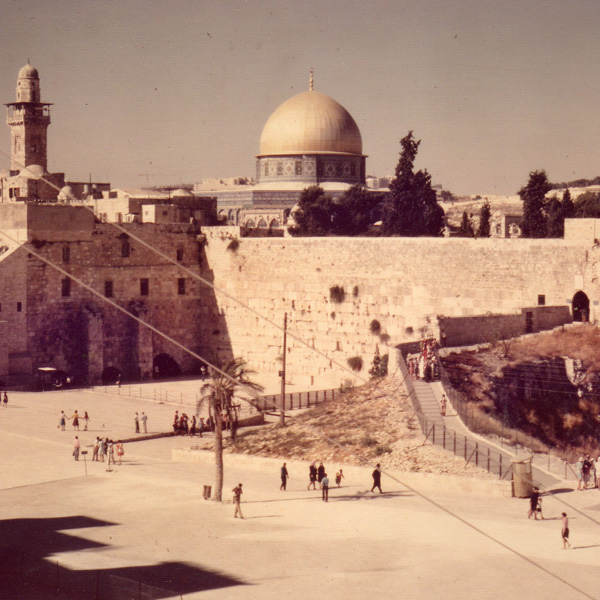Christian pilgrimages to Jerusalem have increased greatly within the last decade. Figures are difficult to come by, but from the United States, many parts of Europe, and Africa, Christian pilgrims visit the Holy Land in large numbers. On a recent visit in May 2015, the author was amazed at the thousands of people who had come ‘from every nation under heaven’ to visit Israel either as tourists or as Christians on pilgrimage.
This article discusses the growing importance of Jerusalem in contemporary world Christianity as the place of prayer. The focus will be on Africa, especially Ghana and Nigeria, but it is clear that we are speaking here of a global phenomenon. We will examine the implications of a proposed pilgrimage to Israel that was to be facilitated by the government of Ghana and its theological implications for a faith that does not attach any particular import to the earthly Jerusalem, the place of its historical origins.
Jerusalem as a place of intercession
In 2013, the government of Ghana faced public criticism for attempting to sponsor some Pentecostal pastors for such a trip. One of the reasons given for the pilgrimage was that the Christian leaders concerned would ‘intercede for the nation on account of its many socio-economic difficulties’. In a statement, the then Minister of Youth and Sports in Ghana noted:
Over the years, various Christian and Church organizations have called on government to sponsor and address the various challenges that they have encountered during their holy trips to Israel. It is in response to all these several calls that the Government then decided to facilitate and coordinate the pilot pilgrimage to Israel to help address some of the challenges Christian groups have encountered on past trips, which is nothing new just as government has been doing for the holy Muslim pilgrimage to Mecca. . . . For them the opportunity to trace the footsteps of Jesus Christ and walk where he walked, pray for their families, their churches, and their country is an opportunity they do not want to miss and a potential life transforming event.
The issue here is the emergence of Jerusalem as a place of effective prayer in the contemporary Christian imagination. A number of evangelical Christian leaders pointed to that as justification for the request to the government to sponsor a Christian pilgrimage to Israel.
Responses from churches, church leaders, and the various Christian ecumenical councils were varied, but the most common explanation offered by those in favour of the trip was that Christians were entitled to state sponsorship for pilgrimages to Israel just as Muslims receive to go to Mecca.
In Nigeria, there has been long-standing agitation for the sponsorship of Christian pilgrimages to Israel because of the support that Muslims receive for the hajj.
Worship in spirit and in truth
The religious and theological issues that arise from the proposal relate to the nature of Christianity itself. It is a religion that neither privileges a particular geographical location as the centre of Christian practice nor sees any form of pilgrimage as critical to the expression of faith. Religious pilgrimages occur in the different streams of Christianity, especially Catholicism, but Jerusalem does not have the same significance in the Christian faith as Mecca has in Islam.

Whereas in Islam, pilgrimage constitutes a major pillar of the faith, Christianity has no such historically recommended geographical centre of religious ritual. In fact, Christianity is about the only world religion that remains a minority faith in its place of origin. In the encounter with the woman of Samaria, Jesus found her trying to tie down acceptable worship of God to a particular location, including Jerusalem. The answer Jesus gave was swift and decisive:
Believe me, woman, a time is coming when you will worship the Father neither on this mountain nor in Jerusalem. You Samaritans worship what you do not know, we worship what we do know, for salvation is from the Jews. Yet a time is coming and has come when the true worshippers will worship the Father in spirit and truth, for they are the kind of worshippers the Father seeks. God is spirit, and his worshippers must worship him in spirit and in truth (John 4:21-24).
Mecca, the original theatre of the revelation of Islam, has retained its religious significance for all Muslims, and this is demonstrated in the quiblah, the direction to which they turn in prayer. Jesus’ direction in terms of where to pray did not refer to any particular geographical location or place: ‘When you pray, go into your room, close the door and pray to your Father, who is unseen. Then your Father, who sees what is done in secret, will reward you’ (Matt 6:6). In this regard, Andrew F Walls speaking about the translatability of Christianity notes that, ‘Christians have no abiding city, no permanent sacred sites; their New Jerusalem comes down out of heaven at the last day.’[1]
Jerusalem in Christianity
Historically Jerusalem has had more significance for Christianity than any other city in the Middle East:
- Jerusalem is the city in which Jesus went through the major events culminating in his crucifixion. Jerusalem also became in the interpretation of Jesus a symbolic representation of all that was wrong with Israel.
- It is the city where the disciples were expected to wait for the outpouring of the Holy Spirit, and the apostolic witness to the gospel was expected to begin from there.
- It hosts some of the major landmarks of the Christian faith.
The reference in the Scriptures to Jerusalem as a ‘heavenly city’ has given its earthly version added significance. Theologically, Jerusalem has remained in the Christian imagination as a replica of the place where Christians will spend eternity. Thus hymns like ‘Jerusalem My Happy Home’ are commonly sung at Christian funerals as indicating the destination of those who serve God faithfully when they depart this life:
Jerusalem, my happy home,
Name ever dear to me!
When shall my labours have an end,
In joy, and peace, and thee?
For those who have had the opportunity to visit Jerusalem and its related cities for religious reasons, it has served the purpose of bringing the Bible alive in terms of some of the descriptions of the ministry of Jesus Christ.
In the course of the public discussion in Ghana and Nigeria on the appropriateness or otherwise of the proposed Christian pilgrimage to Israel, it emerged that some Pentecostal/charismatic Christians who had been there in the past had even sought re-baptism in the Jordan. During his visit to Jordan, the author witnessed many such baptisms of Christians both from the United States and Africa. Most explained baptism in the Jordan as being more authentic than an earlier baptism in other waters.
In the minds of those inclined towards its theological import, it is considered important to institutionalize pilgrimage to Israel in order to put it on the same pedestal as the Islamic hajj.
Christianity has no ‘Mecca’
Jerusalem ceased to be the centre of Christianity when Stephen was martyred. The risen Christ had indicated to the disciples that the promised Holy Spirit was going to be delivered in Jerusalem from which location Christian witness would also begin (Acts 1:4-8). This spread of the gospel from Jerusalem was to begin when, following the martyrdom of Stephen, a great persecution broke out against the church in that city and ‘all except the apostles were scattered throughout Judea and Samaria’ (Acts 8:1). Subsequently, ‘those who were scattered preached the word wherever they went’, with Philip ministering in Samaria (Acts 8:4-8).
Andrew F Walls points out that there is no such thing as ‘Christian culture’ or ‘Christian civilization’ in the sense in which there is Islamic culture or Islamic civilization. Christianity has had several different civilizations, and as Walls notes, there may yet be many more. The reason for this lies in what he calls the ‘infinite translatability of the Christian faith’.[2]
The principle of the incarnation, with God translating into flesh, brings Jesus Christ to the heart of each culture. To that end, God does not privilege any culture; neither does he privilege any geographical location where he may be encountered. As Jesus Christ told the Samaritan woman, those who seek to worship the God who is his Father are simply required to do so, neither on the mountain nor in Jerusalem, but ‘in spirit and in truth’. In the words of Walls:
As the Incarnation took place in the terms of a particular social context, so translation uses the terms and relations of a specific context. Bible translation aims at releasing the word about Christ so that it can reach all aspects of a specific linguistic and cultural context, so that Christ can live within the context, in the persons of his followers, as thoroughly at home as he once did in the culture of first-century Jewish Palestine.[3]
However, an important part of these developments that most of the arguments miss is that there is a whole Christian Zionism movement that has emerged within Pentecostalism in particular. An important international voice in this movement is the Catholic Charismatic theologian Peter Hocken who writes:
Israel is the soil of the incarnation. God’s dealings with the chosen people always reflect a relationship between the particular and the universal, between the chosen people and all the nations of the earth, for whose sake the elect are chosen.[4]
The whole idea is that since Israel has a covenant with God through Abraham, those who help in seeking the good of Jerusalem will also be blessed. There is a whole new theology of blessing by association developing within Christian Zionism.
Conclusion
‘Meccanizing’ Christianity by seeking to hold Jerusalem as being as important to the Christian faith as Mecca is to Islam creates an important theological misnomer. Christian pilgrimages may be undertaken as important parts of personal and communal renewal. However, the statements of Jesus Christ and the subsequent post-resurrection history of the faith indicate that there is really no geographical centre meant to be the focus of Christian encounter with God.

In the words of Paul to the Athenians, who sought to domesticate God in the erection of a physical abode dedicated to an ‘Unknown God’: ‘From one man he made every nation of men, that they should inhabit the whole earth; and he determined the times set for them and the exact places where they should live. God did this so that men would seek him and perhaps find him, though he is not far from each one of us’ (Acts 17:26-27).
In other words, God is spirit and those who seek to worship him must do so in spirit and in truth. Jerusalem may be significant for some reason but Christianity has no ‘Black Stone’ to which we are required to repair for religious credit.
Visits to the land of the Bible can be desired for what they are worth, that is, helping people to connect what they read with what they experience. However, Christians need to be careful not to institutionalize religious tourism to Jerusalem in a way that seems to suggest that it is mandatory for achieving the fullness of life that God makes available to us in Christ Jesus our Lord.
Endnotes
- Andrew F Walls, The Cross-Cultural Process in Christian History (Maryknoll, NY: Orbis Books, 2002), 30.
- Andrew F Walls, The Missionary Movement in Christian History: Studies in the Transmission of Faith (Maryknoll, NY: Orbis Books, 1996), 22.
- Ibid., 29.
- Peter Hocken, The Challenges of the Pentecostal, Charismatic and Messianic Movements: The Tensions of the Spirit (Surrey, UK: Ashgate, 2009), 110.
Photo Credits:
- First image is from ‘Touring in Jerusalem Israel with Nahal Oz Volunteers – Kotel and Dome’ by David King (CC BY 2.0). Second image is from ‘Holly Ka’ba’ by Camera Eye (CC BY 2.0).

